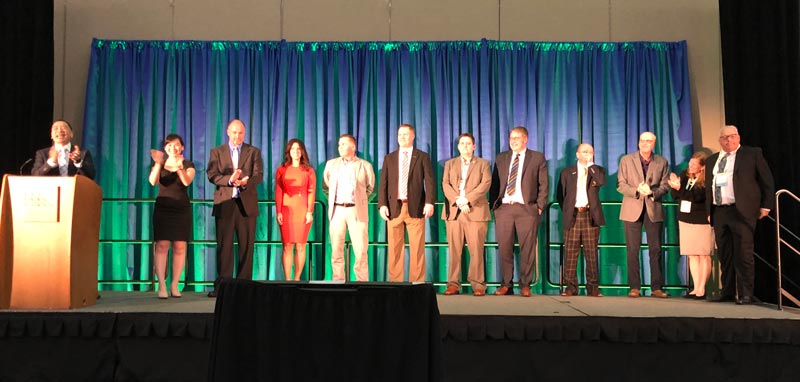
Moderator Frank Wong, Ph.D., (left) and 11 of the 13 Lightning Round Learning! presenters at the close of the education session on Tuesday, Feb. 5. Photo by Andrew Hartsock
Talk about bang for the buck.
Thirteen presenters took five-minute turns at the stage during Lightning Round Learning! on Tuesday at the 2019 Golf Industry Show in San Diego, and the result was a cascade of information on topics as diverse as emotional awareness to the use of silicon on turfgrass.
A full house soaked up the rapid-fire, elevator-pitch free session that moderator Frank Wong, Ph.D., senate regulatory affairs consultant for Bayer, described as a “high-wire act without a net,” or, more chafingly, as “going on vacation without underwear.”
Briefly, then, here’s the lowdown on the already-abbreviated presentations:
Carol Rau, PHR, a regular GCM columnist, exhorted job seekers not to get bogged down in listing tasks in their career documents but instead to appeal to the true decision-makers: “And who are those decision-makers? They’re golfers, who love the game of golf.”
Sam Holysz, equipment manager at Gull Lake Country Club in Richland, Mich., for the past nine years, stressed the importance of communication between superintendents and EMs. “Don’t be afraid to ask questions,” he said, “and don’t be afraid to disagree.”
Jack Fry, Ph.D., a longtime educator at the GCSAA Education Conference and another GCM columnist, spoke about changes to the Rules of Golf. “As superintendents, you need to be more familiar with the Rules ... and I think it will benefit you and your golf course,” Fry said.
Beth Guertal, Ph.D., decorated turfgrass researcher and GCM columnist, gave a quick presentation on the use of silicon on turfgrass. The upshot: “There are proven research studies that show the ability of silicon to help disease suppression, and some theoretical and hypothetical links to its improving turf wear and better golf ball roll.”
The Lightning Round then took an inward turn as Bayer’s Darrin Batisky, a 27-year GCSAA member, talked about emotional intelligence. His take: “IQ is set from birth. Emotional intelligence is a skill — something you can get better at.” Another Batisky gem: “Stress makes you stupid.”
Matthew Weaver, CGCS, followed with a short overview of a “revolutionary approach to the plant disease triangle,” in which he championed the use of plant-defense activators to address the top of that geometric form, the host. Plant activators, he said, don’t remove disease from the equation but lessen its severity: “They are not removing the pathogens from the system, yet in the field we do see these products work in reducing disease.”
Gina Rizzi, president of ARCUS Marketing Group and principal of Radius Sports Group, then took the stage to encourage attendees to break out of their routines. “Some amount of routine can be healthy,” she said, “but it can also limit growth.”
Mike Hebrard, owner of Athletic Field Design in Oregon, discussed his work as a logo painter. He championed the use of drones to spot typographical errors from on high — and showed one example of a misspelled “Oasino” in a Harrah’s Casino logo — and provided some guidelines for logos on courses. “We don’t want it to become like NASCAR,” he said, “but it is a trend we’re trying to develop.”
A self-described “Scottish redneck living in North Carolina,” Eric Duncanson, equipment manager at Pine Needles and Mid Pines Golf Resorts in Southern Pines, N.C., defied his own description of an introvert — “somebody who has a lot to say in their mind, but doesn’t have the confidence to say it” — to deliver a quick rundown on how he developed that confidence to speak his mind. “If I can do it,” he said, “you can do it.”
Marcus Gray, director of Audubon International’s Cooperative Sanctuary Program for Golf, discussed the Monarchs in the Rough program, which encourages golf courses to help preserve crucial — and declining — monarch butterflies by setting aside protected habitat. He emphasized that possibilities to do so exist that won’t impact play, including pine stands and grasslands. “You have a lot of area you can work with,” Gray said.
Kevin Custis, golf course superintendent at Chippendale Golf Course in Kokomo, Ind., and 16-year association member, discussed the importance of planning for natural disasters. Kokomo and surrounding areas were hit by an EF3 tornado in August 2016. Custis’ course was shut for just one day. “You never know how you’ll deal with disaster,” he said, “until you go through it.”
Steve Hammon, golf course superintendent at Traverse City (Mich.) Golf & Country Club for 23 years, spoke about “Raking in the green with a legacy tree program.” His take: Trees planted on-course in memory of — or in honor of — individuals can contribute to family memories, and, “Country clubs are family memories,” he said.
Finally, Delphine Tseng, founder and president of Landseer Communications and Consulting, a multilingual golfer and environmentalist, wrapped up the Lightning Round with a dynamic — and often poignant — story about her personal journey. “What have I done,” an emotional Tseng asked rhetorically, “to deserve this?”
Andrew Hartsock is GCM’s managing editor.